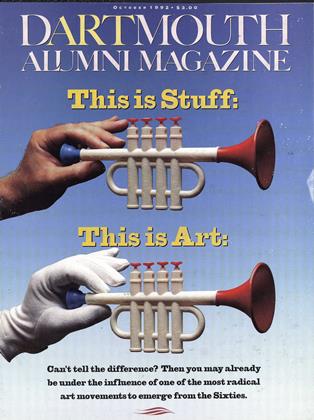A YEAR AND A HALF ago the Alumni Magazine caught up with Victor Zonana '75, the business writer-turned AIDS correspondent for the Los Angeles Times, and asked him about the disease he had turned into a beat. A lot has happened in that year and a half. Zonana is back doing business reporting ("I was ready to leave the AIDS story after two and a half years," he says.). And he has garnered national recognition as founder of the New York branch of the National Lesbian and Gay Journalists Association.
After his own recent coming out, Zonana realized a need for gay reporters to come together to answer several fundamental questions. Can they be objective in dealing with sexually oriented issues? Can heterosexuals be objective with sexually oriented issues? Must reporters deny they have associations that may be interpreted as political, or must they attempt to be objective while admitting their biases?
"Journalists are trained not to take sides. Or if they take sides, not to declare publicly what side they're on," notes Zonana. "We're trained not to join things, and appropriately so, so there's always been this tension for journalists who are gay. By coming out it's undeniable that you are making a political statement. " At the same time, he says, "It's an acknowledgment of identity and it is telling the truth, which is what journalists are also trained to do."
Zonana's group hosted a well-publicized party on the eve of the Democratic National Convention in the penthouse of the Royalton Hotel. Honorary cochairs included New York Times Publisher Arthur Sulzberger Jr., L.A. Times Publisher Shelby Coffey, and CNN President Tom Johnson.
"It's really all about getting gay people to be seen as more than subhuman and deserving more than epithets like faggot and dyke and the knives and baseball bats of gaybashers," says Zonana. "It's just that nobody spoke up. Or at least no one in a position to be listened to spoke up for a long time—until now."
Zonana
 View Full Issue
View Full Issue
More From This Issue
-
 Feature
FeatureTHE LISTENING DEAN
October 1992 -
 Cover Story
Cover StoryThe Stuff of Art
October 1992 By LEE MICHAELIDES -
 Feature
FeatureThe Underground Curriculum
October 1992 By Tim Brookes -
 Article
ArticleThe Lost Season
October 1992 By JIM COLLINS '84 -
 Article
ArticleDid Something Happen in 1492?
October 1992 By William Spengemann -
 Article
ArticleDr. Wheelock's Journal
October 1992 By "E. Wheelock"
Tig Tillinghast '93
-
 Article
ArticleThe Second Four Years
September 1992 By Tig Tillinghast '93 -
 Article
ArticleOne Good Pull
September 1992 By Tig Tillinghast '93 -
 Article
ArticleThe Anti-Doctor Doctor
December 1992 By Tig Tillinghast '93 -
 Cover Story
Cover StoryRethinking The Stacks
December 1992 By Tig Tillinghast '93 -
 Feature
FeatureCure1 For The Common Cold2 Proven3 At Dartmouth4!
December 1992 By TIG TILLINGHAST '93 -
 Feature
FeatureTwo Women, Once Alive
October 1993 By Tig Tillinghast '93
Article
-
 Article
ArticleDARTMOUTH PLAQUE WON BY PHILLIPS ANDOVER ACADEMY
April, 1923 -
 Article
Article49 in '49
April 1945 -
 Article
ArticleFall Reunions
SEPTEMBER 1982 -
 Article
Article27
NOVEMBER | DECEMBER 2015 -
 Article
ArticleReflections of a Dickey Intern
NOVEMBER 1984 By Diana Shannon '85 -
 Article
ArticleBoston, Mass., June 8, 1910
May, 1910 By H. W. Hardy, ’97


